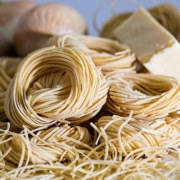Noodle
Noodles originated in China over 4000 years ago, yet using the word noodle to refer to food in the English language was actually adopted from the similarly pronounced German Nudel in 1779, almost a hundred years before the word pasta entered English from Italian and long after English had begun using noodle to mean “head”. As pasta is essentially flour drawn out into long thin shapes, the German word Nudel is likely from the German word Knödel, which means dumpling, usually made from wheat or other starchy products. The plural Nudeln in German can refer to almost all forms of pasta, such as spaghetti, shells, spirals and so on.
In English a noodle today is a specific form of pasta: usually a long, thin, curly shape, and not a short or straight one, and is made from finer flour than other pasta, or from a gluten-free alternative to flour such as rice. Often these noodles are of the kind widely eaten in Asia such as ramen, and nowadays are available in portion-sized packets for quick preparation at home.
The English expression “Use your noodle” means “Think!” or “Think about it!” and may reflect a perceived similarity between a cooked bowl of curly noodles and the many curves of the human brain, or simply a much older English meaning: from the sixteenth century the word just referred to the human head, later coming to mean a foolish person, and in the present “noodling” can mean acting foolishly or wasting time.


 https://en.wikipedia.org/wiki/Creative_Commons
https://en.wikipedia.org/wiki/Creative_Commons
